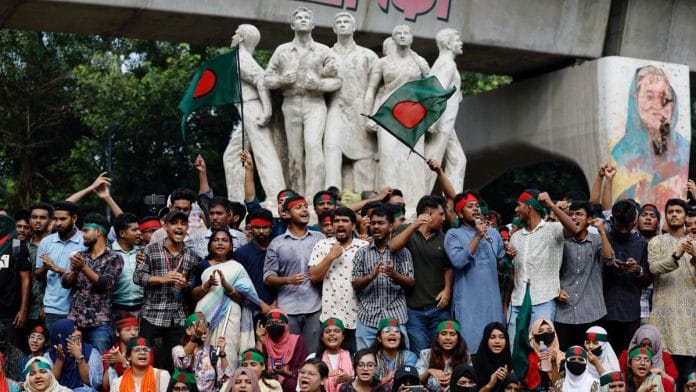New Delhi: Key political parties in Bangladesh are fighting over the country’s independence narrative, with the controversy centred around whether Bangladesh achieved “true independence” in 1971 or through the 2024 uprising.
The debate flared up after Mia Golam Parwar, the secretary general of Bangladesh Jamaat-e-Islami, challenged the legitimacy of the 1971 Liberation War, arguing that independence in 1971 was not “true independence” but an agreement that compromised Bangladesh’s sovereignty.
“To those who claim to uphold the spirit of the Liberation War, I would say that you had actually made agreements to sell the country to Delhi for political interests,” Parwar said at an Independence Day event in Dhaka Wednesday.
He added that the country’s “second liberation” came through the mass uprising of 2024, which he described as a renewed struggle for freedom.
The opposition Bangladesh Nationalist Party (BNP) slammed Parwar’s remarks.
BNP leader Mirza Abbas condemned the idea of a “second independence”, stressing that such a claim undermines the historic significance of the 1971 liberation.
“There is no such thing as a second independence,” he said in front of former president Ziaur Rahman’s grave on Independence Day.
BNP Secretary General Mirza Fakhrul Islam Alamgir also criticised Parwar’s comments, accusing him of distorting the country’s history.
Meanwhile, Nahid Islam, convener of the National Citizen Party, also rejected Parwar’s statement, saying the 2024 uprising was a continuation of the 1971 struggle for independence.
“We believe that 1971 and 2024 are not separate events,” he told the media Wednesday.
Islam added to the debate, saying that those engaged in opposition politics through compromises over the past 15 to 16 years may not view the July uprising as a form of independence.
“Yesterday, there was a debate about the first and second independence. However, for those of us who have endured various forms of oppression over the past 16 years, this is undoubtedly independence. On 5 August, we were truly liberated once again,” Nahid said during a discussion and prayer event at the Jatiya Nagorik Committee’s office in Dhaka.
Also read: Amid trade war with US, China’s Exim Bank backs relocation of Chinese manufacturing to Bangladesh
Jamaat’s role in the Liberation War under scrutiny
The debate has also rekindled questions about the role of the Jamaat-e-Islami in Bangladesh’s liberation struggle.
Parwar lashed out at the BNP for labelling Jamaat “anti-liberation” and highlighted the party’s historical contribution. He said that BNP’s alliance with Jamaat in the past contradicted their current stance, accusing the party of hypocrisy.
“Before criticising Jamaat, BNP should acknowledge our contributions,” Parwar said, claiming that Jamaat’s support was instrumental in the BNP’s success in forming a government and leading anti-Awami League movements.
Meanwhile, the interim government is also facing accusations of revising the definition of ‘Bir Muktijoddha’, the title given to those who fought in the 1971 Liberation War.
Bangladesh’s interim government head Mohammad Yunus is reportedly considering redefining the term to include only those directly involved in combat, while others will be categorised as “Liberation War Associates”.
This move has sparked further controversy, with critics accusing the government of distorting the nation’s history.
An editorial in The Daily Star accused the government of neglecting the issue of fake freedom fighters, with thousands reportedly obtaining the status through forged documents.
“Corruption at the relevant ministry and the fraudulent gazette listings of non-freedom fighters have severely damaged the credibility and reputation of our liberation war,” the editorial read.
Alamgir also criticised the omission of Ziaur Rahman, the proclaimer of Bangladesh’s independence, in recent speeches by Yunus, adding that the country’s history was being misrepresented.
“The nation will forever remember Ziaur Rahman’s contribution to achieving independence,” said Alamgir.
Call for early elections
Amid the war of words, political leaders are also calling for early elections.
Alamgir reiterated the BNP’s demand for an election to restore democratic governance, criticising the current interim government for its failure to lay out a clear election roadmap.
Yunus, in his speech on Genocide Day on 25 March, said that the interim government will hold elections between 2025 and July 2026.
Alamgir, speaking on Independence Day, stressed that Bangladesh still faces significant challenges in creating a truly democratic and prosperous country.
“Without a clear roadmap for elections, the ongoing crises will remain unresolved,” he stated.
Parwar, too, made similar demands.
“Once necessary reforms are completed, the government will hold elections, and Jamaat is ready to participate,” he added.
(Edited by Sugita Katyal)
Also read: Beijing is set to exploit Dhaka-Delhi rift. Yunus is visiting China this week







Love you Bangladesh?? Assam Tripura west Bengal Bangladesh??